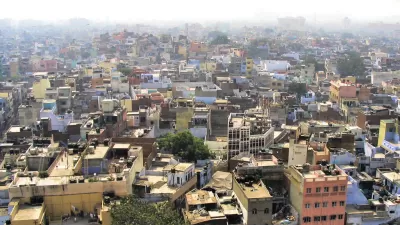Research into the various shapes of cities in India may be able to predict the economic success of the city's residents.

Wharton professor of real estate, Mariaflavia Harari writes in Knowlede @ Wharton about her research into the influence of the shape of a city on the economic success of residents and businesses. "My research question was what influence, if any, does a city’s shape have on the location choices of consumers and firms? Do consumers and firms benefit in terms of welfare or productivity from locating in cities with particular shapes?"
Harari’s research has made some interesting linkages between the shape of the city and average local wages and housing rents. More compact cities tend to have higher wages and rent, with circular cities being the most ideal for reducing commute times and improving efficiencies. However, since no city can be a perfect circle, Harari looks at the consequences of natural geography on a city.
…I’m not simply making a crude comparison between compact and non-compact cities in my analysis. I look at what happens when a given city becomes less compact as a result of hitting some topographic obstacle, like a mountain or a lake, as it expands in space. What I find is that when a city ends up with a worse geometry because of hitting some geographic constraints, its population growth slows down, and housing rents and local wages tend to decrease.
Harari writes that her research can have an impact, particularly in India, where growing cities are sprawling outward due to restrictions on building heights that limit opportunities for compact development that could lead to better efficiencies.
FULL STORY: What Urban Design Reveals about Economic Development

Maui's Vacation Rental Debate Turns Ugly
Verbal attacks, misinformation campaigns and fistfights plague a high-stakes debate to convert thousands of vacation rentals into long-term housing.

Planetizen Federal Action Tracker
A weekly monitor of how Trump’s orders and actions are impacting planners and planning in America.

San Francisco Suspends Traffic Calming Amidst Record Deaths
Citing “a challenging fiscal landscape,” the city will cease the program on the heels of 42 traffic deaths, including 24 pedestrians.

Defunct Pittsburgh Power Plant to Become Residential Tower
A decommissioned steam heat plant will be redeveloped into almost 100 affordable housing units.

Trump Prompts Restructuring of Transportation Research Board in “Unprecedented Overreach”
The TRB has eliminated more than half of its committees including those focused on climate, equity, and cities.

Amtrak Rolls Out New Orleans to Alabama “Mardi Gras” Train
The new service will operate morning and evening departures between Mobile and New Orleans.
Urban Design for Planners 1: Software Tools
This six-course series explores essential urban design concepts using open source software and equips planners with the tools they need to participate fully in the urban design process.
Planning for Universal Design
Learn the tools for implementing Universal Design in planning regulations.
Heyer Gruel & Associates PA
JM Goldson LLC
Custer County Colorado
City of Camden Redevelopment Agency
City of Astoria
Transportation Research & Education Center (TREC) at Portland State University
Jefferson Parish Government
Camden Redevelopment Agency
City of Claremont


























